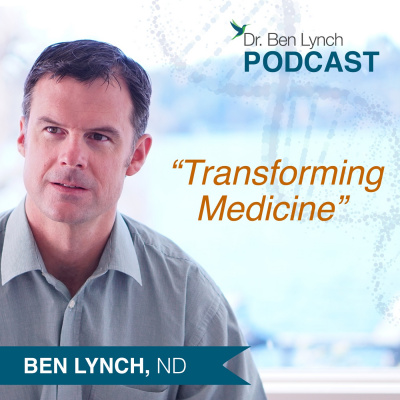Dr Ben Lynch Podcast
- Autor: Vários
- Narrador: Vários
- Editora: Podcast
- Duração: 27:42:45
- Mais informações
Informações:
Sinopse
Focusing on methylation, nutrigenomics, lifestyle, nutritional biochemistry and epigenetics. Dr Ben Lynch brings you current findings and turns them into tools you can use.
Episódios
-
-
-
Methlyation Anxiety Inflammation Webinar 21816
19/02/2016 Duração: 01h14minMethlyation Anxiety Inflammation Webinar 21816 by Dr Ben Lynch
-
-
How to Sauna (professional)
22/01/2016 Duração: 01h24minHow to Sauna (professional) by Dr Ben Lynch
-
-
SHEI Arginine Webinar 11/23/15
30/11/2015 Duração: 01h02minSHEI Arginine Webinar 11/23/15 by Dr Ben Lynch
-
Understanding the CBS Enzyme Webinar
18/09/2015 Duração: 01h16minUnderstanding the CBS Enzyme Webinar by Dr Ben Lynch
-
4 Forms Of Vitamin B12
17/09/2015 Duração: 05minThere is more than one form of Vitamin B12. What's the difference between each of them? Cyanocobalamin - synthetic B12 that is poorly utilized by the body. Throw it away! Methylcobalamin - A biochemically active form of B12 important for methylation. Many people are deficient--vegans/vegetarians, those who take antacids, or don't eat much meat. Adenosylcobalamin - The mitochondrial form of B12 that supports energy production. These patients may have high methylmalonic acid (MMA) levels. Hydroxocobalamin - Can be used to reduce nitric oxide levels if they are too high.
-
What Is Methylation Webinar
04/09/2015 Duração: 01h19minWhat Is Methylation Webinar by Dr Ben Lynch
-
Why You Should Stop Taking Folic Acid
03/09/2015 Duração: 05minStop taking synthetic folic acid. Folic acid is poorly converted to reduced (active) folate. Folic acid also competes with biopterin for DHFR (dihydrofolate reductase). Biopterin is crucial for neurotransmitter production.
-
Folate & Folic Acid - Whats the Difference
01/09/2015 Duração: 04minIs active folate only available in supplements? No! Methylfolate (an biochemically active form of folate) is found naturally in vegetables, like leafy greens. Folic acid is a synthetic form of folate used to fortify overly processed foods! Avoid it as much as you can. There are over 200 forms of folate! In summary: Eat whole foods for quality folates. Avoid synthetic folic acid in processed foods.
-
-
Cant Stay Asleep
20/08/2015 Duração: 04minAre you falling asleep without issue, but waking up 2-3 hours into the night? Here are 2 common reasons why you might be waking up at night: 1) Blood sugar imbalance - If your blood sugar drops too much at night, your body releases norepinephrine and cortisol to raise your blood sugar, but this also wakes you up. Maybe you are eating too early. Have your healthy fats, carbohydrates, and proteins at most 3-4 hours before bed. 2) Stress - Stress causes imbalances in cortisol levels. Look for ways to calm down and reduce the burden on your adrenal glands.
-
I Cant Fall Sleep
18/08/2015 Duração: 07minNeurotransmitters are important to keep you alert at the right time. Cortisone rises in the morning and decreases in the evening. Melatonin is lower in the morning and is higher in the evening to make you feel sleepy. Artificial light, laptop monitors, and cell phones can inhibit the production of melatonin at night. Eating foods high in glutamate in the evening can make it difficult to feel sleepy (you can find specific foods at nutritiondata.self.com). Magnesium, B6, and niacin also help break down glutamate into the calming GABA. Try to avoid histamine containing foods in the evening. Lowering histamine levels also helps lower glutamate levels.
-
SHEI Q & A on Methylation & Nutrigenomics 8/6/15
07/08/2015 Duração: 01h21minSHEI Q & A on Methylation & Nutrigenomics 8/6/15 by Dr Ben Lynch
-
I Cant Wake Up!
05/08/2015 Duração: 05minHaving trouble waking up in the morning? Learn how to stop hitting the snooze button. In this video, I discuss strategies to help your body wake up and increase alertness in the morning. 1) Increase morning light - more light in your bedroom in the morning helps burn off melatonin (the sleepy hormone). Try a sunrise/sunset alarm clock that gradually increases light in the room in the mornings. 2) Support cortisol production - Cortisol is known as the stress hormone, but you need appropriate amounts to wake up and remain alert. Constant stress can deplete your cortisol levels. Supplement with vitamin C, vitamin B5, and adrenal cortex in the morning with breakfast (supplements should be used temporarily--only while you need it.) 3) Support ATP (the body's fuel source) production - consider an NADH supplement. NOTE: Fatigue and inability to wake up can be caused by a medical condition like hypothyroidism among others. Work with your doctor to make sure these strategies are right for you. Did you like this
-
Q & A Methylation & Nutrigenomics
28/07/2015 Duração: 01h10minQ & A Methylation & Nutrigenomics by Dr Ben Lynch
-
Methylfolate vs. Folinic Acid - What's the difference?
08/07/2015 Duração: 04minMethylfolate and folinic acid can both be converted to the other via enyzmatic reactions, but this isn't always easy for the body to do. Consider the functions of each: Methylfolate supports methylation with the help of methylcobalamin. Methylation supports 200+ enzymatic reactions! Folinic acid supports DNA base production in rapidly dividing cells including growth of hair, skin, and lining of the intestines.
-
Niacin (Using it to Offset Methylfolate Side Effects )
08/07/2015 Duração: 04minNiacin (Vitamin B-3) is involved in over 400 biochemical reactions in the body! As with other nutrients, methylfolate and niacin levels need to be in balance. High doses of specific nutrients will push certain biochemical pathways more than others. This is why niacin can be used to offset methylfolate side effects. Niacin deficiency can cause: irritability, headaches, migraines, and possibly skin issues.

































